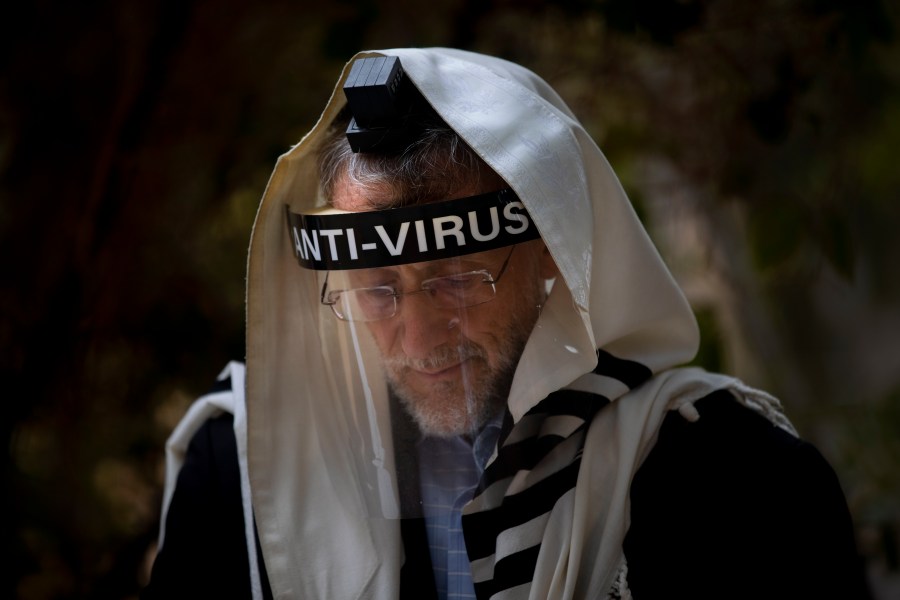Israel tightens second lockdown as coronavirus cases soar

An Israeli woman walks past a banner encouraging people to wear face masks in Tel Aviv, Israel, Thursday, Sept. 24, 2020. Israeli Prime Minister Benjamin Netanyahu on Wednesday announced plans for a strict, two-week nationwide lockdown in a bid to slow a raging coronavirus outbreak. (AP Photo/Sebastian Scheiner)
JERUSALEM (AP) — Israel on Thursday moved to further tighten its second countrywide lockdown as coronavirus cases continued to soar, ordering all nonessential businesses to close and requiring people to stay within 1,000 meters (yards) of their homes.
Prayers during the ongoing Jewish High Holidays, as well as political demonstrations, would be limited to open spaces and no more than 20 people, and participants would have to remain within the restricted distance from home.
The measures are set to go into force on Friday afternoon, as the country shuts down for the weekly Sabbath ahead of the solemn holy day of Yom Kippur on Sunday and Monday. Even during normal times, Israel completely shuts down for Yom Kippur, the Jewish Day of Atonement, with businesses and airports closed, roads empty, and even radio and television stations going silent.
In a televised address Thursday night, Prime Minister Benjamin Netanyahu acknowledged the pain caused by the closure, but said the holiday season, when many businesses slow down in any case, was the best time to take action.
Comparing the situation to a war, he said the measures would save lives. “Wake up. Enough is enough. We are in a new reality,” he said.
The limits on both prayers and protests could spark a backlash.
Israel’s politically influential ultra-Orthodox community has objected to limits on public prayer during the ongoing Jewish High Holidays, and Netanyahu opponents have accused him of using the lockdown as a cover to end weekly demonstrations against his handling of the crisis.
Netanyahu dismissed such allegations as “absurd,” saying all of the restrictions were for public safety.
In a separate address, Netanyahu’s former rival and now governing partner, Benny Gantz, called for national unity.
“We cannot allow anyone to exploit and deepen polarization and make us lose this battle,” he said, vowing that protesters could take to the streets and worshippers could fill synagogues once the situation is brought under control.
“Saving lives comes before anything else. Anything at all,” Gantz said in a speech outside his home. Hecklers could be heard shouting at him in the distance.
The government ordered synagogues to close for the lockdown, which is expected to last for at least two weeks, but said they could open with limitations for prayers on Yom Kippur, the holiest day in the Jewish calendar.

Hagai Levine, a professor of epidemiology and a member of an expert panel advising the government, warned that allowing Yom Kippur prayers in synagogues could lead to mass transmission.
He went so far as to compare it to the 1973 war, when Egypt and Syria launched a surprise attack on Israel during Yom Kippur. “Now, it’s no surprise. We are going to have a massive problem and massive transmission on Yom Kippur in a few days,” he said.
He said the government should instead impose a complete lockdown for a short period to underscore the seriousness of the situation, followed by the gradual easing of restrictions on essential but low-risk activities.
Israel is currently reporting nearly 7,000 new daily cases, making the outbreak in the country of 9 million people among the worst in the world on a per capita basis.
Israel won praise this spring when it swiftly moved to seal its borders and shut down most businesses. By May, its daily rate of new cases had dropped into the double-digits. But then it reopened the economy too quickly, leading to a surge of new infections over the summer.
In recent months, a national unity government that was formed to address the pandemic has been mired in infighting, with authorities issuing unclear and sometimes contradictory guidelines, leading much of the public to disregard the risk.
Many businesses, meanwhile, have yet to recover from the earlier lockdown, and the new restrictions are expected to take a heavy toll on the economy even though they are being imposed during the holidays, when many businesses would ordinarily scale back hours.
Israel has reported a total of more than 200,000 cases since the pandemic began, including 1,335 deaths. It has more than 50,000 active cases.
The Health Ministry says at least 667 people are hospitalized in serious condition, and in recent days health officials have warned that hospitals are rapidly approaching full capacity.
The government last week imposed a nationwide lockdown that closed schools, shopping malls, hotels and restaurants, making Israel the first developed country to impose a second closure. But the restrictions included numerous exceptions, including allowing people to leave their homes for work, exercise, prayers and public demonstrations.
The new lockdown is expected to eliminate most of those loopholes.










